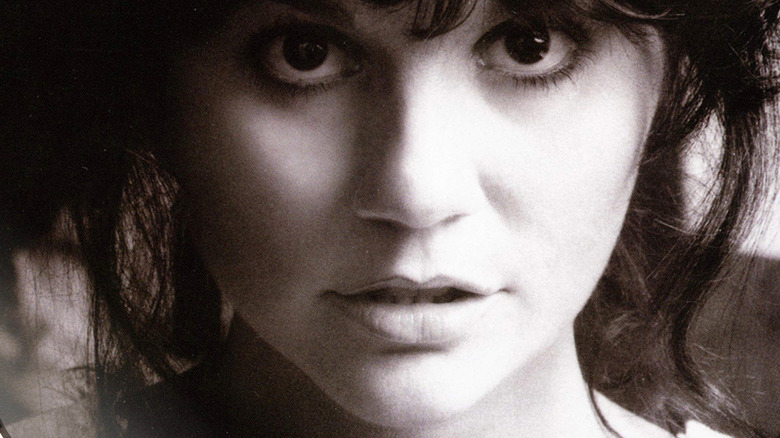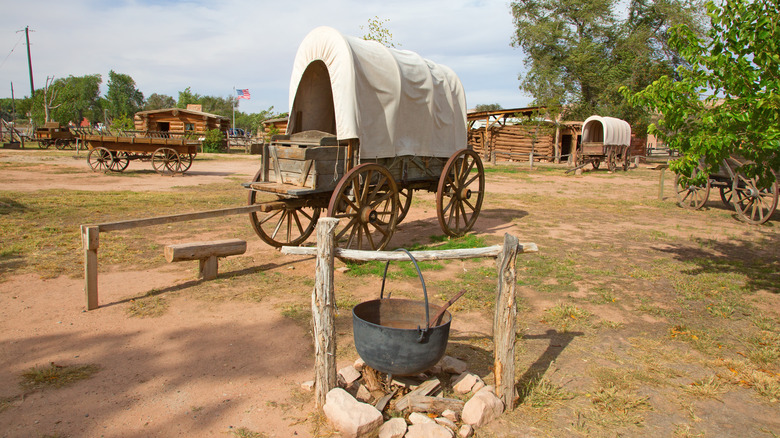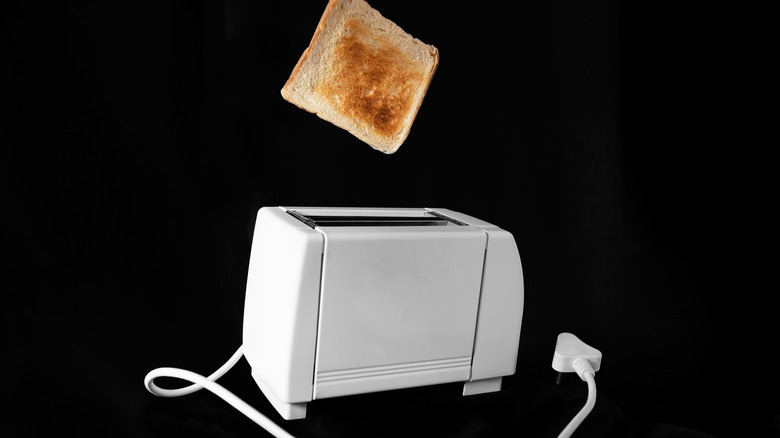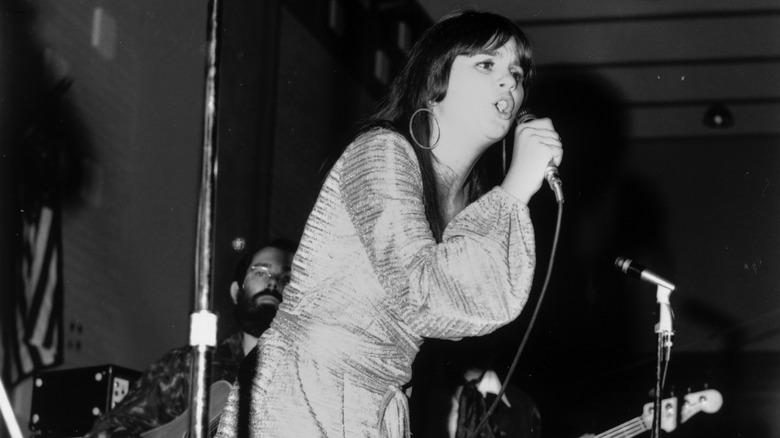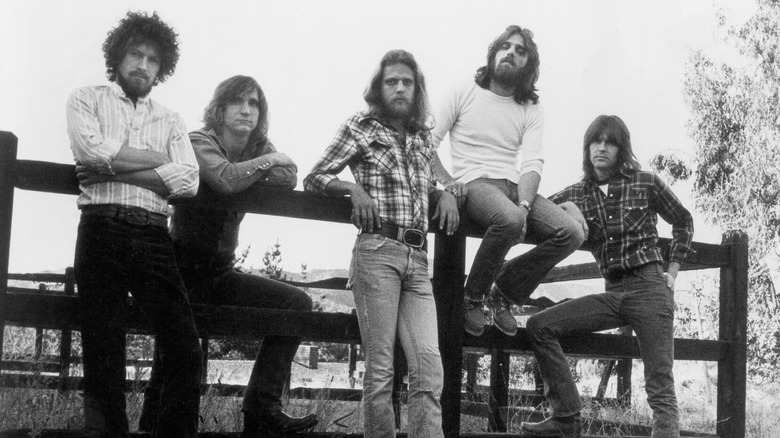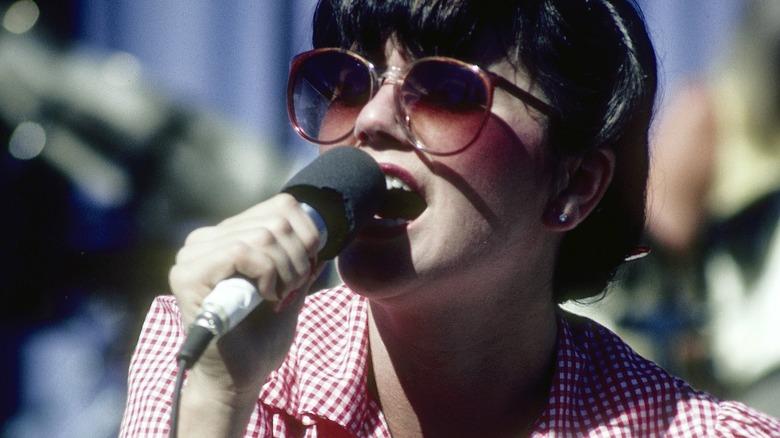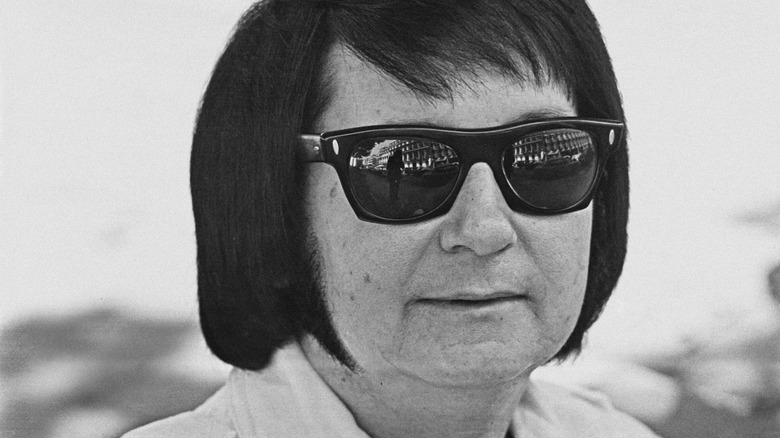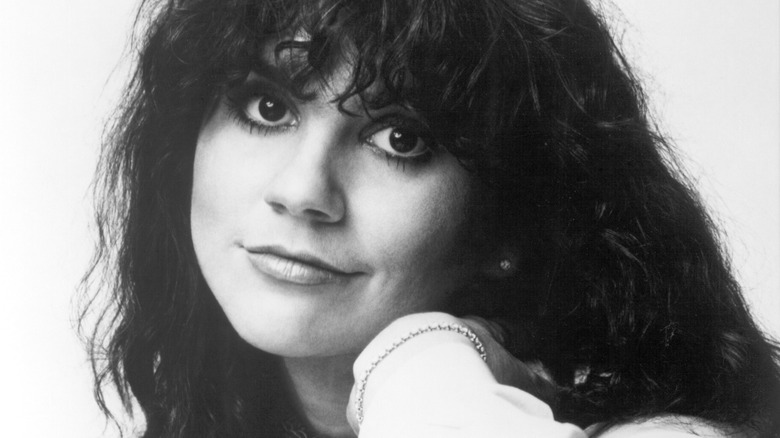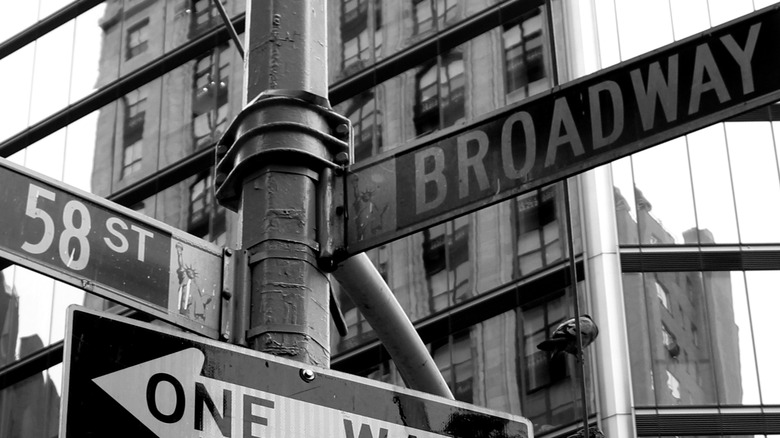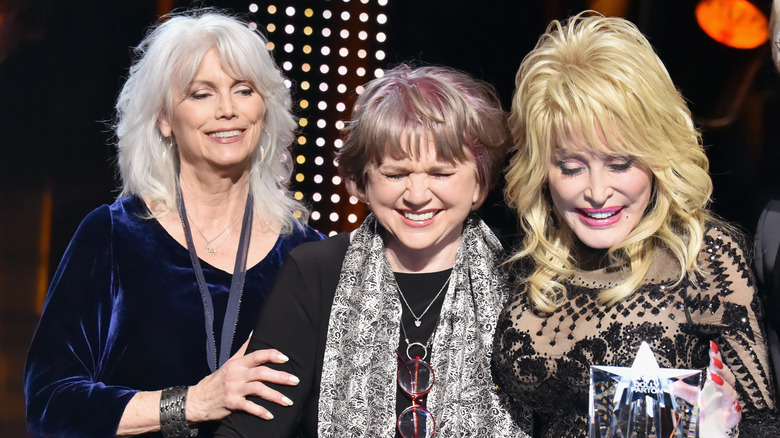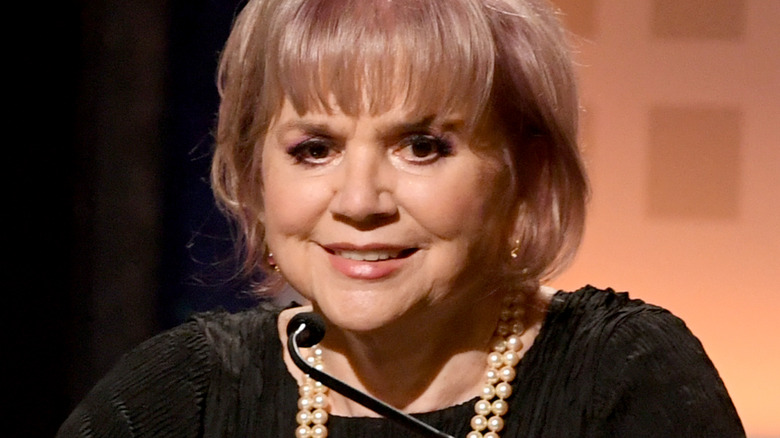The Untold Truth Of Linda Ronstadt
For over a decade, Linda Ronstadt enjoyed a sterling reputation as the Queen of Rock. Never mind that she doggedly refused to pin herself down to just one genre; when you rock as awesomely as she did, you get stuck with catchy titles.
With her striking looks and even more striking pipes, she sold records and concert tickets at a rate that was, at the peak of her career in the '70s, unheard of for a female solo artist. Pretty much the only knock anyone could level against her was that Ronstadt had a tendency to record a lot of covers — and since a whole lot of those became the most well-known, iconic versions of those songs, it turned out to be not much of a knock at all.
Ronstadt, though, was far more than a pretty face and dynamite voice. She sports a unique family history, not to mention her own interesting legacy of activism and eye-popping musical versatility. Here's the story behind one of the most badass women to ever hold a microphone: the inimitable Linda Ronstadt.
Her family helped build Arizona before it was even a state
Thanks to Linda, the Ronstadt name is well-known all over the world — but in her home state of Arizona, it was known far and wide before she was even born. This is because her great-grandfather, Federico Jose Maria "Fred" Ronstadt, was a guy who saw a lot of potential in the place when it was still just a territory, and when he was just a teenager. According to a piece by Fred's son Edward and published by the University of Arizona, Fred arrived in Tucson in 1882 at the age of 14. There, he spent years learning the blacksmithing and wagon trades; in his early 20s, he began a family and started the business that would eventually become the F. Ronstadt Hardware Company, which would become a Tucson fixture and remain in business until 1985.
In addition to that successful venture, the Ronstadts are also known for their contributions to bringing pharmacies to the dusty plains of Arizona, and also (of course) for being a very musical brood. The University of Arizona maintains an archive dedicated to "Tucson's Ronstadt Family," which contains only a few brief mentions of its most famous member in the "Music" section. Indeed, Linda's father (who, incidentally, was running the hardware store at the time it finally closed its doors) had a pretty interesting family — but there was a heck of a character on her mother's side, as well.
Her maternal grandfather was a prolific inventor
Linda Ronstadt's mother, Ruth Mary Ronstadt, was born Ruth Mary Copeman in Flint, Michigan. Ruth's father, Lloyd Copeman, was something of an inventor, which is to say that he was extremely prolific in coming up with ideas that ranged from "pretty cool" to "wildly ahead of their time." According to Inventor's Digest, Lloyd studied mechanical engineering at Michigan State — from which he was expelled, we like to think for simply being too rad. Copeman showed them up by inventing, among other things, an early, working version of a microwave oven ... in 1918. In Ronstadt's 2013 biography "Simple Dreams," she explained, "He called [it] 'cold heat,' [and demonstrated it] by frying an egg through a newspaper. Thinking that the oven was too expensive to manufacture, he never patented it."
The list of things he did patent, according to his official website, is about as thick as a phone book and contains nearly 700 separate filings: gizmos like electric stoves, toasters, electric drills, refrigerators, ice cube trays, and other things that wouldn't come into widespread use for years after he conceived of them. In her memoir, Ronstadt said that after kicking all that tail, MSU offered Copeman an honorary degree, which he turned down flat, saying, "When the degree would have done me some good, you wouldn't give it to me. Now I have little desire to accept it."
She got an early musical education
Gilbert Ronstadt, hardware store manager, is probably responsible for a lot more awesome music than most people who claim that profession. According to a 1975 Rolling Stone piece on Linda Ronstadt, he was a guitarist who played informally with mariachi bands during a period in which he lived in Mexico. It was he, Linda said, who made sure that she grew up on a steady diet of killer melodies and harmonies, exposing her to the likes of the Beach Boys, Peggy Lee, and Billie Holiday.
With that kind of musical education, it's little wonder that as a high-schooler, Linda formed a musical trio with her brother and sister, according to Biography. While performing with them at Catalina High School, Ronstadt met Bob Kimmel, a folk musician who was just as impressed with her voice as everyone else. The two struck up a friendship, but Kimmel shortly thereafter moved to Los Angeles to pursue his musical ambitions.
While Ronstadt finished up high school, he continually pestered her to come on out and start a band with him — and after graduating and completing a single semester at the University of Arizona, she did. Their band, the Stone Poneys, released a few albums, scoring one modest hit: "Different Drum," written by The Monkees' Michael Nesmith. According to the Wall Street Journal, that tune peaked at No. 13 on Billboard's pop chart in 1967
One of her first backing bands led to the formation of the Eagles
After three LPs, Linda Ronstadt cut the Poneys loose. According to her memoir (via Billboard), while cycling through different supporting musicians in the early '70s, Ronstadt hired a couple of guys that would go on to a somewhat notable degree of success. Her manager, John Boylan, had recently fielded a demo from some dude named Don Henley, who had written a couple of songs he thought Ronstadt might like to record. "They didn't turn out to be good songs for me at the time, but I heard him play the drums when I was walking through the room at the Troubadour and I thought he was such a good drummer," she remembered. So, she enlisted Henley and one of his acquaintances, whom she knew from the local scene: guitarist Glenn Frey.
The pair bunked together while touring with Ronstadt, and quickly figured out they had some pretty good chemistry. They announced their intention to start their own band to Ronstadt, and then, magic happened. "I suggested they get Bernie Leadon to play guitar, 'cause I liked Bernie, and John suggested that they get Randy Meisner," she said, "and that's how the Eagles were formed." The new band rehearsed at Ronstadt's house, and almost immediately, their extreme awesomeness was apparent. "I remember coming home one day and they had rehearsed 'Witchy Woman' and they had all the harmonies worked out," Ronstadt recalled. "It was fantastic. I knew it was gonna be a hit."
Linda Ronstadt absolutely conquered the '70s
Linda Ronstadt and the Eagles went their separate ways, only to both go on to completely dominate rock in the '70s. According to a 1980 Playboy piece on Ronstadt, she had a reasonable degree of success with her first three solo albums, even earning a Grammy nomination for "Long, Long, Time" from 1970's "Silk Purse." Her fourth record, "Don't Cry Now," earned Ronstadt her first gold platter, and her fifth, 1974's "Heart Like a Wheel," went double-platinum and scored the singer her first No. 1 tune — a swaggering version of Clint Ballard, Jr.'s "You're No Good." Another track from that album, a cover of Hank Williams' "I Can't Help It (If I'm Still In Love With You)," notched her the first of many Grammy wins.
Ronstadt followed up that success with 1975's "Prisoner In Disguise," 1976's "Hasten Down the Wind," 1977's "Simple Dreams," and 1978's "Living In the U.S.A." — all of which went platinum or better, and yielded massive singles like "Heat Wave," "Blue Bayou," "It's So Easy," and "Ooh Baby Baby." Playboy also noted her insane ability to sell out arenas during this period — again, pretty much unheard of for a female solo artist at this time — and in 1980, she was named by Cashbox as the most successful female artist of the entire decade.
She's a deft interpreter of other songwriters' works
Although she was known to pen a tune or two, you may have noticed that some of those massive hit songs we mentioned are also associated with other artists. As we mentioned, Ronstadt never shied away from interpreting the work of others, because it turned out that she was really, really good at it. There's a reason, for instance, why "Blue Bayou" — penned by the legendary Roy Orbison, and previously covered by the equally legendary Elvis Presley — is more associated with Ronstadt than either of those guys. Dolly Parton ("I Will Always Love You"), Buddy Holly ("It's So Easy"), Warren Zevon ("Hasten Down the Wind," "Poor, Poor Pitiful Me"), Elvis Costello ("Alison,") and her old buddies Don Henley and Glenn Frey ("Desperado") all got the Ronstadt treatment, and frequent Eagles writing partner J.D. Souther penned a few tunes specifically for her.
In a 2013 Music Radar interview, Ronstadt was frank about her disinclination to write songs herself. "Songwriting wasn't my gift. I think you have to cultivate a gift; you have to practice and develop craft around your gift ... so that you can execute it in more convenient, efficient ways," she said. "I just didn't wake up and say, 'I've got to write a song.' Jackson Browne wakes up and writes a song down on a napkin — that was his gift. I used to live with J.D Souther, and I would watch him write. He'd be sitting, he'd say something, and then he'd write it down. That's craft."
Ronstadt became a sex symbol, almost against her will
Now, the '70s were a very different, far sleazier time, and if you think female celebrities are objectified now (which they very much are), then prepare for your monocle to pop out. During that heady decade, sexual objectification was practically par for the course among famous women (and, heck, a lot of famous men, too), and Linda Ronstadt certainly didn't escape this phenomenon. In the 1980 Playboy interview, she was asked relentlessly (of course) about her sex symbol status. "I didn't set out to become a sex symbol. I set out to be a singer," she said. "I've never tried to keep sexuality out of my personality or my singing. It's fun that people think I'm sexy."
What wasn't so fun, though, was Ronstadt's treatment by Rolling Stone a few years earlier, when legendary photographer Annie Leibovitz fleshed out (so to speak) a piece on Ronstadt with a series of borderline-softcore pictures which the singer did not approve of. "Annie saw [the photo shoot] as an expose´ of my personality," Ronstadt would later tell the New Times. "She was right. But I wouldn't choose to show a picture like that to anybody who didn't know me personally, because only friends could get the other sides of me in balance ... That picture implied that when I said girls didn't have to be butch to be equal to the guys that I meant they had to go to the other extreme and look real dishy all the time. The point is to be yourself, to be a female person."
She performed on Broadway and in an opera
After conquering the popular music world in the '70s, Linda Ronstadt decided to stretch out a bit, and venture into a couple of worlds where few pop singers dare to tread. The first: Broadway, where she held down a starring role in a 1981 production of the classic Gilbert and Sullivan musical "The Pirates of Penzance." The show started out off-Broadway (per Newsweek) before moving to the big show, where the general critical consensus was that she crushed it in the service of a somewhat lacking production. (The New York Times, for example, praised her performance while panning the musical's sound design.)
In 1984, Ronstadt took on "La Boheme," the Puccini opera that she'd dreamt of starring in for years, according to Newsweek. Unfortunately, it didn't go quite as well, and the Times was particularly savage, if oddly forgiving. "Miss Ronstadt seems tentative and shaky, and the panic rarely subsides thereafter," its reviewer wrote. "Whatever else is to be said about this performer, she's no fool and no coward. One can tell at a glance that Miss Ronstadt herself knows that she's not at home with Puccini — and one can only admire the bravery that allows her to forge ahead anyway, reason be damned."
She landed in hot water for breaking a boycott of South Africa
In the early '80s, one of the hottest venues on the planet had an appropriate name: Sun City Resort and Casino, where some of the world's most popular music acts plied thier trade to the adoring throngs. Unfortunately, the place was located smack dab in South Africa, which at the time was something approaching an international pariah due to its forced racial segregation policies, commonly known as apartheid. Because of this, many more of the world's most popular acts refused to play there — but not Linda Ronstadt. According to Africa Is a Country, Ronstadt played a 1983 gig there in violation of the music industry's informal boycott, joining such megastars as Barry Manilow, Rod Stewart, and one of her idols, Dolly Parton.
Ronstadt received understandable backlash, against which she pushed back with a jaw-dropping yet completely reasonable rebuttal. Speaking with journalist Don Lane, she said, "If you disagree with the policies of the government, which I do very definitely disagree with the policies of the South African government, I don't think that's enough of a reason not to go and play music there ... If I decided that I wasn't going to play where attitudes of racism prevailed I certainly couldn't play in Australia, or England, or lots of places in the United States." Touché, Miss Ronstadt. In 1985, the protest song "Sun City," spearheaded by E Street Band guitarist Steven Van Zandt, brought further attention to the issue.
She later became an outspoken political activist
In later years, Linda Ronstadt put her money where her mouth was in terms of her politics. In 2004, while playing the Aladdin in Las Vegas, she had the unmitigated gall to dedicate her cover of old buddies the Eagles' "Desperado" to filmmaker Michael Moore, whose incendiary documentary "Fahrenheit 9/11" had recently won the coveted Palme D'Or at the Cannes Film Festival (via The Progressive). In response, Aladdin president Bill Timmins took the ridiculous step of throwing Ronstadt out of the hotel, and banning her from playing there again.
One might get the idea that Ronstadt was not a fan of President George W. Bush, and one would be correct. In 2006, she referenced the Dixie Chicks' infamous calling-out of Bush with a strongly worded defense of the band, and a blistering condemnation of the then-president: "The Dixie Chicks said they were embarrassed he was from Texas. I'm embarrassed George Bush is from the United States," she said (via Contact Music). "He's an idiot. He's enormously incompetent on both the domestic and international scenes."
Ronstadt has also been staunch in her support of the gay community. Speaking with Gay.net in 2009, she said, "[One] of the strongest [communities] that we know in this country is in the gay community, because they've had to band together to survive emotionally. I'm not so sure this country understands or values that."
She featured on a pair of albums with two other legends
Linda Ronstadt enjoyed a long association with a couple of other absolute musical powerhouses: Emmylou Harris (with whom she dueted on "The Sweetest Gift" in 1975) and Dolly Parton (whose iconic "I Will Always Love You" she covered that same year). According to The Boot, the three had been longtime friends, and in 1987, they came together to release a long-awaited collaboration album, the aptly-titled "Trio."
The project was gestating for years beforehand, with the busy schedules of all three delaying its eventual fruition — but when it finally happened, it did not disappoint. It shot to No. 1 on the Billboard country albums chart, scored a Grammy Award for Best Country Performance By a Duo or Group with Vocal, and produced a No. 1 country single with the Phil Spector-penned "To Know Him Is To Love Him," according to Dolly Parton's official website. The three friends would reunite to record a follow-up, "Trio II," which was released in 1999.
She was forced into retirement by illness
According to Sounds Like Nashville, it was right around 2000 when Linda Ronstadt began having trouble with her once-powerful voice. By 2009, she could no longer paper over those problems when performing live — and in 2013, it was reported by USA Today that the singer had been diagnosed with Parkinson's disease. "I think I've had it for seven or eight years already, because of the symptoms that I've had," she confided at the time. "No one can sing with Parkinson's disease, no matter how hard you try."
Several years later, though, she received a new diagnosis: not Parkinson's, but a rare brain disorder called supranuclear palsy. In a 2020 interview with CNN, Ronstadt described her struggle with the disorder. "I couldn't hear the top end of my voice. I couldn't hear the part that I used to get in tune," she said. "My throat would clutch up. It would just be like I had a cramp or something ... Literally my entire career flashed in front of my eyes."
Unfortunately, she's simply no longer capable of producing those astounding tones that sold millions of records and drew tens of thousands to hear her perform in her heyday — but it's not as if her legacy isn't secure. In 2014, she became a first-ballot Rock and Roll Hall of Famer, and as far as her millions of fans are concerned, she'll always be one of the greatest vocalists ever, in any genre.
